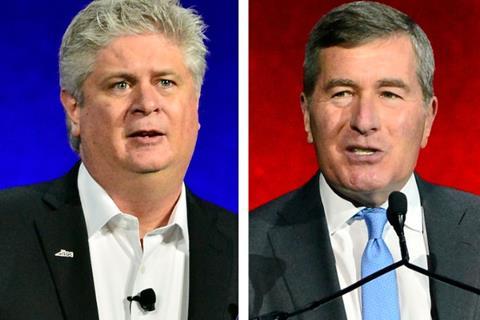
CinemaCon’s annual state of the industry address on Tuesday featured the twin attack of NATO head Michael O’Leary’s maiden address and an impassioned talk on piracy from MPA head Charles Rivkin.
O’Leary urged investors to support exhibition and touched on what is already shaping up to be a signature theme of his tenure – support for the independent sector and lower budget cinema.
“Getting more capital into the system will benefit everyone – creatives, studios, exhibition, local communities and, most importantly, movie fans,” O’Leary told attendees at The Colosseum.
“Movies on the big screen benefit everyone. More compelling movies bring more movie fans to the theatre, which in turn increases the desire of consumers to return and see what is coming next. Everyone wins.”
The NATO president and CEO continued: “We should always support partners and marketplace decisions that increase movie production and put more movies with a clear, exclusive theatrical run and marketing support into your cinemas.
“We know that a movie that begins its journey with theatrical exclusivity is more successful in every subsequent ancillary platform.”
O’Leary spoke of what he called a “reimagination” that was underway, cuing up his sole reference to last year’s brutal Hollywood strikes that shut down studio, streamer and much of independent production for six months.
“We saw it last year in the creative community and labour negotiations that involved unique and important issues that only a few decades ago would have been unimaginable,” he said, adding that distribution and exhibition were also poised to benefit from “inflection points”.
He continued, “And this last year has shown me that the future of this industry – indeed, the state of this industry – is limitless.”
Last year’s actors and writers strikes have resulted in what is expected to b a slimmer pipeline in 2024. Experts predict North American box office could end in the $8-8.5bn range compared to just over $9bn in 2023.
O’Leary added, “To have a truly successful filmed entertainment industry, a variety of movies that appeal to movie goers is critical,” he said. “It is not enough to rely solely on blockbusters – we must have a strong and vibrant market for movies with smaller or medium sized budgets.”
He noted that Independent Theatre Owners Coalition held its AGM in Las Vegas on Monday but did not elaborate on details.
MPA “leading the charge” to pass anti-piracy site blocking law
Prior to O’Leary’s address, MPA chairman Charles Rivkin said the organisation was “leading the charge” to enact judicial site blocking legislation in the United States, which he said was a notable absentee from nearly 60 countries including the UK that has laws in place.
Rivkin said site blocking disrupts the connection between pirates and viewers, adding that it “dramatically reduces piracy”.
“It’s long past time to bring out laws in line with the rest of the world,” he said, after noting that online global digital piracy costs theatres more than $1bn in box office in an average year
The MPA head said of the pirates, ”Remember – these aren’t teenagers playing an elaborate prank. The perpetrators are real-life mobsters, organised crime syndicates, many of whom engage in child pornography, prostitution, drug trafficking, and other societal ills.
”They operate websites that draw in millions of unsuspecting viewers whose personal data can then fall prey to malware and hackers. In short, piracy is clearly not a victimless crime.”
According to testimony from MPA SVP and global general counsel Karyn A. Temple before a House of Representatives committee last December, the US Congress previously considered site blocking and backed off in 2012 after concerns were raised that the measure would break the internet.
Temple noted that since than more than 40 countries had enacted site blocking laws, which have led courts and agencies to disable access to more than 90,000 domains used by more than 27,000 websites “engaged in blatant piracy”.







![The Brightest SunScreen[Courtesy HKIFF]](https://d1nslcd7m2225b.cloudfront.net/Pictures/274x183/3/5/0/1448350_thebrightestsunscreencourtesyhkiff_312678.jpg)

















No comments yet